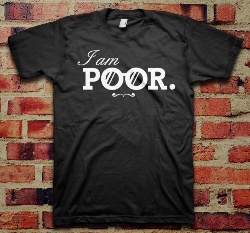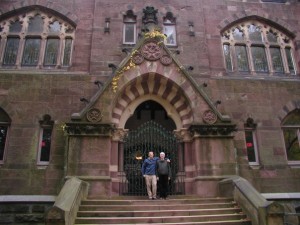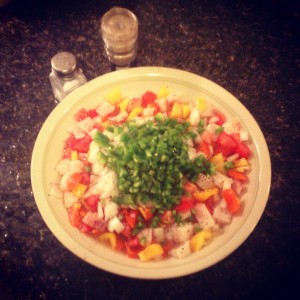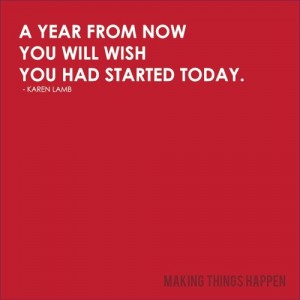Yes! You, Too, Can Easily Make Ceviche
29 Oct 2013 9 Comments
in Pwn All The Things, Simplicity
I recently posted a kind of grainy Instagram of some ceviche I fixed up the other day to my facebook profile, and the thing garnered more “likes” at a swifter velocity than just about any other status update I’ve dropped all year. A couple people asked for a recipe, which I basically wing every time I make this stuff. And that made me realize that perhaps there are a number of folks out there who do not know the simple, liberating truth:
Yes! You, too, can easily make ceviche. Here’s one method that works for me–try at your own risk / reward. First, acquire the following if you want to feed one of me or else two-to-three normal people:
- 6 limes
- 2 lemons
- 4 tilapia fillets
- 1 large onion
- 1 large tomatoe
- 1 bell pepper
- 2 jalapenos
- 2 avocados
- Salt and pepper to taste
Next, do this:
- Squeeze all the juice out of the limes and lemons and place it in a bowl or casserole dish or something–basically, the flatter bottom’d the better if you want the ceviche it to cure fast. Optional: Throw the spent husks of citrus at those haters who think you can’t cook and may even be right until now.
- Dice the fillets so each little fish cube is about the same size–this way, they will all “cook” at the same rate. Put all of them in the bowl or dish or whatever and spread them out so the juice is covering at least 50% of every cube. (Better if all of them are completely submerged.)
- Dice all the other vegetables EXCEPT FOR THE AVOCADOS and put them on top of the lemon/lime juice submerged fish. It doesn’t matter quite so much if the vegetables are covered by the juice since they don’t need to “cook.” Trick for jalapenos: slice them in half first and run them under water while you press out the seeds; this will keep any burning acid from flying in your eyeballs when you dice them, as tragically happened to my poor friend, Sid Duffour, the other day.
- Throw some salt and pepper on top of everything, cover the top of the bowl / dish, and stick it in the refrigerator for 15 minutes. How much salt and pepper, you ask? I don’t know man–whatever works for you. Make some decisions! When in doubt, use less seasoning since you can always put more in there when you eat the stuff whereas nanotechnology or magic is necessary to take the seasoning out if you get a little overzealous.
- Stir everything up and stick it back in the refrigerator for 15 minutes.
- At this point, the acid in the lime/lemon juice should have chemically “cooked” the fish. You’ll know if this happened because the fish will turn whitish, just as if you had actually cooked it with fire. If you’re scared of eating raw fish, just let it sit in the refrigerator for another 15+ minutes. Also, you might want to steer clear of sushi…
- When you’re ready to consume this delicious amalgam, dice your avocados and mix them in with everything else. If you stick the avocados in at the beginning, they tend to gradually melt away into the ceviche. Which is kinda tasty but not as much as when they persist among the mixture as nice little cubes. If you don’t know how to easily pit an avocado, this guy’s method works; after you’ve pitted the avocado, slice it into cubes while it’s still in the skin and then scoop it out with a spoon–people will think you’re a genius when the truth is that you’re well-read.
My favorite way to eat this is straight out of the bowl with El Ranchero tortilla chips. And if you think that’s weirdly specific for an otherwise lackadaisical recipe, you clearly need to get some of those chips, rated by Gaper’s Block Media as “Chicago’s Best” over six years ago. Also, you can swap other seafood in for some of the tilapia if you want, e.g. 2 tilapia fillets + 1 handful of peeled shrimp + 1 handful of shelled scallops ≈ biomass of 4 tilapia fillets. Just let the whole mixture sit for a total of, say, 45-60 minutes with stirring every 15 minutes or so to be sure that everything is thoroughly “cooked” by the lemon/lime juice since you’ll be working with different types of protein that cures at different rates. I personally like to stick with tilapia because it’s cheap and delicious and super easy to prep, but ymmv. Finally, you spruce this up a few more notches by throwing some cilantro in there, going halfsies on serrano peppers in place of the jalapenos, and so forth. Experiment!
Enjoy with a tamarind Jarritos, a couple tracks from Tipica 73 in the air, and the woman you love in your arms. Or the man or dog or cat, but not a fish because that’s just cruel.
Finding Happiness Between My Desires and God’s Will
31 Jul 2013 12 Comments
in Bible, Christian praxis, Pwn All The Things, Q&A, Shop Talk, Theology
 I’ve discovered that one of the things that motivates me to write swiftly and, evidently, pretty decently is when I encounter pointed questions from people about whom I deeply care. (Also, when topics arise that just happen to weirdly pique my interest.) So, I’ve decided to launch a new Q&A series addressing stuff like this as it organically arises in my conversation with folks. For this first installment, we’ll take a look at an example of one whole category of questions that I hear with greater frequency than anything else from people who are earnestly trying to follow Jesus. Enjoy!
I’ve discovered that one of the things that motivates me to write swiftly and, evidently, pretty decently is when I encounter pointed questions from people about whom I deeply care. (Also, when topics arise that just happen to weirdly pique my interest.) So, I’ve decided to launch a new Q&A series addressing stuff like this as it organically arises in my conversation with folks. For this first installment, we’ll take a look at an example of one whole category of questions that I hear with greater frequency than anything else from people who are earnestly trying to follow Jesus. Enjoy!
Q. How does one truly, totally trust God? What part do my desires and sense of “need” play in the process? For years, I’ve heard that the Creator of the universe doesn’t need my help–God already knows how every series of events is going to play out in the end, including all my decisions. So, do I restrain my own wishes and just go with the flow as life progresses? Or do I take action when some particular set of conditions come into play? In either case, what does it mean to trust God amidst all this?
Trying to resolve this question has always been really tough for me. I have repeatedly tried to “be in God’s will” with all that I am and all that I do. And I have also been told that being “in God’s will” means that I would be happy and at peace. When I was younger, I was also told by a lot of people possessing some sort of spiritual authority precisely what God’s will was–basically, I was told that my own wishes and desires didn’t matter. As I look back on everything I’ve been through over the years, I can honestly say that I have experienced a lot of happy times in my life; however, I cannot say that I am happy and “at peace.” And so now, I have a really hard time believing that I will ever get what I really want–leaving it to God alone to work out supernaturally or something–and so I am compelled to try and help Him get the ball rolling!
What part do my desires play in living in a God-honoring way? This conflict of desires and disconnect between what I have been told about how my life in God should look for feel can cause a lot of stress.
What a great question! The standard, from-the-hip Bible verse people often bust out on this topic of Proverbs 3:5-6 is actually pretty instructive: Trusting in God with all your heart means NOT merely taking your own counsel alone, acknowledging God in every dimension of your life, and walking the path towards which God directs you when that actually happens. Conflicting desires are just a process challenge, meaning they present no fundamental barrier to moving towards some goal that God finds satisfying while you trust God.
Sure, there are times where we want something that is not in our best interests to pursue, in which case you could say that our desires truly conflict with God’s will–I find that cases like these are usually the really obvious ones where we are morally obligated to do or not do something, e.g. steal, lie, cheat, dodge legitimate responsibility, appropriately love our neighbor, etc. On the other hand, it’s possible for God to be totally okay with multiple different outcomes in the case of morally permissible activity, e.g. which godly spouse do I marry, which pair of shoes do I wear today, which healthy faith community do I join, which decent job do I work / carrier path do I embark upon, etc. In cases like these, it’s possible to encounter conflicting desires where no particular course of action once chosen would conflict with God’s will because all courses of action under consideration are morally permissible. In my experience, this is the majority of life; in fact, we can actually expect to encounter more situations like this as we grow in strength and encounter more possible options.
In the event that we don’t know how to reconcile conflicting desires where all of those desires are basically ethical, trusting God at least in part means picking an option (even if that option is rejecting all courses of immediate action to gain more clarity, wisdom, etc. before making a move) while believing that God will remain with us and continue to love us moment by moment even in that place of ambiguity of future outcome. This is one reason why an oppositional state of affairs to trusting God is worrying, and that’s why Jesus instructs his followers to eschew worrying specifically by trusting God, e.g. Matthew 6:24-34:
“No one can serve two masters. Either you will hate the one and love the other, or you will be devoted to the one and despise the other. You cannot serve both God and money. Therefore I tell you, do not worry about your life, what you will eat or drink; or about your body, what you will wear. Is not life more than food, and the body more than clothes? Look at the birds of the air; they do not sow or reap or store away in barns, and yet your heavenly Father feeds them. Are you not much more valuable than they? Can any one of you by worrying add a single hour to your life?
“And why do you worry about clothes? See how the flowers of the field grow. They do not labor or spin. Yet I tell you that not even Solomon in all his splendor was dressed like one of these. If that is how God clothes the grass of the field, which is here today and tomorrow is thrown into the fire, will he not much more clothe you—you of little faith? So do not worry, saying, ‘What shall we eat?’ or ‘What shall we drink?’ or ‘What shall we wear?’ For the pagans run after all these things, and your heavenly Father knows that you need them. But seek first his kingdom and his righteousness, and all these things will be given to you as well. Therefore do not worry about tomorrow, for tomorrow will worry about itself. Each day has enough trouble of its own.”
 That said, the sort of peace that scripture promises us when we rightly pursue God, eschew worry, and embrace a posture of trust does not refer to a total cessation of all tension in our lives. Rather, it refers to a state of harmony or complementarity between the trajectory of our lives and God’s purposes. Think of it like this: Right now, I am “at peace” with the President of the United States because my activity as a citizen of the United States harmonizes with the overall trajectory of that President and our humanly instituted government. Nevertheless, I still encounter points of tension in my life–and this would be true even if the President were perfect like God and the United States government was absolutely just and loving, like the Kingdom of God as it breaks into our world. Why is that? Because life! On this side of history before Christ’s triumphal return, we may find wholeness and strength and unity with God and with each other, but we will not find a total cessation of all tension–a wiping away of every tear with “no more death or mourning or crying or pain” described by passages of scripture like Revelation 21:4–because these are all aspects of a future state of affairs depending on God’s institution of total justice on the far side of Jesus’s second coming.
That said, the sort of peace that scripture promises us when we rightly pursue God, eschew worry, and embrace a posture of trust does not refer to a total cessation of all tension in our lives. Rather, it refers to a state of harmony or complementarity between the trajectory of our lives and God’s purposes. Think of it like this: Right now, I am “at peace” with the President of the United States because my activity as a citizen of the United States harmonizes with the overall trajectory of that President and our humanly instituted government. Nevertheless, I still encounter points of tension in my life–and this would be true even if the President were perfect like God and the United States government was absolutely just and loving, like the Kingdom of God as it breaks into our world. Why is that? Because life! On this side of history before Christ’s triumphal return, we may find wholeness and strength and unity with God and with each other, but we will not find a total cessation of all tension–a wiping away of every tear with “no more death or mourning or crying or pain” described by passages of scripture like Revelation 21:4–because these are all aspects of a future state of affairs depending on God’s institution of total justice on the far side of Jesus’s second coming.
As a result, we can certainly expect happiness and joy as we seek after the Lord while making all sorts of decisions in the day to day, but we should absolutely not expect to find an unbroken chain of bliss while the world remains a broken place that God is in the process of redeeming. This calls for courage. That’s why in trying to encourage the relatively young and inexperienced leader, Timothy, we find the older and more experienced leader, Paul, saying that “God has not given us a spirit of fear and timidity, but of power, love, and self-discipline” (2 Timothy 1:7). Courage only bears content in the face of something that is scary; we need power and love and self-discipline specifically in the face of things that are difficult, that tend to provoke hateful wrath, that threaten to erode our perseverance. Yes, we can expect times of joy and happiness as we seek after Jesus, but we can also expect times of difficulty–even and perhaps especially when we are on the right track. As Christ himself said to his followers according to Mark 10:29 and following, “Truly I tell you…no one who has left home or brothers or sisters or mother or father or children or fields for me and the gospel will fail to receive a hundred times as much in this present age: homes, brothers, sisters, mothers, children and fields—along with persecutions—and in the age to come eternal life.”
So to cap off this caveat, really trusting in God while making decisions about conflicting desires as we follow after Jesus means dealing squarely with the fact that we will encounter a mixture of good times and bad, happy times and sad. Moreover, we should remember that this is a normal thing, an outcome we should expect versus an indication that something has gone wildly off kilter. I’ve found that when I approach things this way, any anxiety about whether I am on the right track or how I should approach resolving this or that conflicting sets of desires tends to diminish.
Basically, we’re talking about a posture that is active in the face of dynamic, real world conditions rather than passively waiting around for God to magically work out everything with no effort on our part. At the same time, we’re talking about a posture that drinks deeply and thankfully of those times of happiness and joy without being thrown to terror in the face of sadness or difficulty, a posture that bases its ultimate hope and ultimate confidence in the supernaturally durable love of God transcending all things and bringing all things to ultimate reconciliation beyond anything we can do or even conceptualize. To see an example of all these different points pulled together in one statement, consider one of the last things Jesus communicated to his followers before he was crucified according to John 16:33, “I have told you these things, so that in me you may have peace. In this world you will have trouble. But take heart! I have overcome the world.”
Note: For a pretty decent, longer read on how to make God-honoring decisions in general, check out Gary Friesen’s Decision Making and the Will of God. Love you lots–you rock! (P.s. For pure fun, maybe also listen to this song “Call My Name” by Tove Stryke, about which I am currently obsessed.)
Gain Command & Control Now – Building Wealth Tip No.1
18 Feb 2012 4 Comments
in 33rd Birthday Reflections, Building Wealth Tips, Pwn All The Things
Prologue: Since October of 2011, I have been posting a series of reflections on some of the most important lessons I learned the hard way over the past year. I published the first of these shortly after my birthday regarding the fine line separating the utterly depressing from the categorically awesome, arguing that we should relentlessly pursue the latter as if our lives depended on it (because they actually do). A few weeks later, I shared a second reflection addressing the common misconception that working hard is enough, asserting that we will only be substantially rewarded for bringing something of clearly discernible value to a given state of affairs and not for our efforts alone–a truth so obvious that we constantly miss it and suffer accordingly.
While considering which topic to address next, I received a bunch of requests for input on personal finance. I learned my most difficult lessons in this area a few years ago. Nevertheless, I’m interested in writing about stuff that is helpful to others whether or not it fits perfectly with my outstanding plans for blogging. So, I guess one can take all of the posts in this category of “Building Wealth Tips” to constitute a nice, multi-part lesson cross-listed in that category of those “33rd Birthday Reflections,” just in case anybody is keeping score.
Finally, I’ve noticed that a lot of people get spooked from substantial discussions about personal finance because so many of these discussions are 1) ridiculously focused on bean counting, 2) nowhere close to being comprehensively instructive, and 3) lacking hardcore, scientific support for the activities they so passionately promote. Instead, I’ll begin with a personal story and gradually work my way towards some nuts and bolts mechanics of the discipline, thoroughly citing the main things I want to share as food for thought. I figure that anybody reading this blog who wanted a bunch of arithmetically fixated information right out of the gate or a collection of disassociated financial pro-tips will have looked elsewhere already. There’s something else “in the way” for a lot of us when it comes to really gaining financial strength, and my goal with this post is to obliterate that obstacle as much as possible.
Also, I’ve never shared this story with anybody before. So, I hope it provides some insight for you.
~

F. Scott Fitzgerald may have been one of the most impactful American authors of the 20th century, but his weak command of personal finance still ruined his life.
I packed my last suitcase and slung two ill-fitting blazers over my left shoulder. The pine trees framing my dormitory window fragmented beams of late-afternoon sunlight, dribbling their golden rays across my face in piecemeal obscurity as the day’s events disturbed my hopes for what lay ahead. I was partway through a graduate course of study at Princeton Theological Seminary with a vaguely defined career goal, a sharply reinforced cost, and a path almost perfectly opposed to Fitzgerald’s Amory. I knew that God was still alive and kicking in my heart, that wars worth fighting abounded, and that there was some good in humanity still. But I was just moments away from the abrupt realization that I did not know myself as surely as I thought. And I was completely embarrassed to learn this lesson through what seemed like the most base catalyst possible: Money.
I had just signed a promissory note for another several thousand dollars of student loans, a process required by my school every year seminarians wanted to avail themselves of such an opportunity to offset the cost of their education. And despite the fact that I had concluded that such a thing was “good debt,” I had never come close to possessing a tenth of what I now owed. Plus, I still had another year and another round of loans to go. Having grown up just above the poverty line, nobody from whom I had received financial counsel in the past could speak compellingly to my situation. I had been taught to avoid all debt like the plague, but I recognized that the net effect of achieving a more substantial education earlier in my life, likely leading to a higher level of compensation for my labor, was the more mathematically sound way to go. Moreover, none of the people who had so thoroughly impressed upon me the importance of avoiding all debt were particularly wealthy, which either meant that it was impossible to grow legitimately wealthy in one’s lifetime that way (a demonstrable falsity) or that there was something fiscally wrong with their perspective.
In short, math and logic were picking a fight with my upbringing. And while I knew that logic and math told no lies, I hadn’t risked anything this gutturally important on them since that one time I won a bet about calculating the velocity at which a drunken friend would strike a submerged refrigerator after leaping from a bridge suspended a certain height above a river–thanks to integral calculus. Delaying my education until I could afford to pay for it out of pocket with money squirreled away from whatever job I worked in the meantime deferred an increase in my earning potential, an increase great enough to easily outstrip the cost of financing the aforementioned loan. But more importantly, such a delay prevented me from pursuing the sort of work I wanted sooner by definition, which also postponed all sorts of life-events, relationships, and complimentary endeavors connected to that work. This made my student loan a type of investment in myself enabling a swifter, more impactful benefit for the people and projects what would be positively impacted by my own growth. And since this was a federally subsidized loan under consideration, there were all sorts of advantages and protections woven into the system amplifying the smartness of incurring that debt despite the inherent risk that even the most worthwhile investments carry.
Simple call, right? Wrong–I panicked.

In grad school, I was too poor to justify buying this shirt that retails at $25 from playwho.com. Oh, the irony...
I looked for every feasible way I could whittle down my expenses to as close to nothing as possible. I ate fewer meals and guiltily sneaked cereal out of my dining hall for breakfast the following morning. I bought no clothes, which made me horribly dependent on the good graces albeit risky stylistic conjunction of holiday presents. I spent hours researching the most inexpensive versions of the class texts I was forced to buy when repeatedly checking them out at the library would not suffice. I rued the fact that I could not afford to take a lady I fancied on anything but an utterly cheap date–all the while not picking her up in the car I did not posses because I was too freaking penurious to purchase a decent vehicle, let alone maintain one. And while thrifting and cycling were all the rage among the graduate student set in my hometown of Chicago, this approach was not generally well received or advised at Princeton.
Deep inside, I sensed that all my efforts at frugality were insignificant. I was sure that I needed to substantially cut a major cost. And dormitory housing coupled with a mandatory meal plan was my single, largest expense category. So, I made a painful decision to mitigate that by taking a job as a resident manager of an institutionally affiliated conference center off the seminary quad, enabling me to effectively zero-sum rent, food, and part-time pay. While that probably sounds like a brilliant idea, I said “painful” because the life of an aspiring theologian at Princeton was frequently, deeply lonely for reasons I’ll probably get around to describing some other time. Healthy, robust community was rare and difficult to cultivate even living on campus, let alone removed from it, and it was not just something I craved but something I wanted to be able to give to others at the core of who I was.
Cultivating robust, healthy community where people could grow and support one another to their mutual benefit was a central, guiding principle of the life I wanted to live. Being able to engage in this project more effectively on the far side of seminary was one of the main reasons I chose to pursue that course of training in the first place. Thus, my aforementioned financial “solution” functioned as a shift of expense from finance to purpose and ethics. In fact, it risked a net loss of “wealth” defined not just as one’s fiscal wherewithal but also the strength of one’s key relationships, long term prospects, freedom, security, and so forth. My solution threatened a conflict with who I wanted to be, what I wanted to do, and what I knew that both my colleagues I needed at that stage of our lives. But there was no way to ascertain whether the benefits of this shift would be worth the cost apart from giving it a shot and finding out. And since the whole idea of a seminary education boiled down to an investment in me, my own lack of confidence in myself effected a recursive loop of irritatingly pitiful consternation.

A shot of me with my dad around the time of the events described by this post outside the main classroom building at Princeton
I planned a final departure from my dormitory when most other students were taking their evening meal to avoid encountering anyone who might probe the turmoil I feared I could not keep from surfacing. I strode briskly through the autumnal dusk across the deserted quad. And while I was somewhat tired from previous trips carting boxed-up belongings to and fro, I felt something other than mere fatigue silently approach me from the darkening woods lining my path. If you’ve ever blacked out from standing up too fast, felt your stomach drop whilst peering over a momentous ledge, or sensed a tingle run through your limbs before executing an exciting but also terrifying feat, you know about the sensation. You’ve felt everything around you slow down. You’ve become hyper-aware of your own processing of whatever’s confronting you, and your mind has raced with abnormal clarity to exhaust all available options towards some eureka-like conclusion by brute-force if necessary.
And that’s when something within me finally broke.
I felt dazed and moved to tears and short of breath and stymied and somehow also somewhere else from everywhere I had ever been before. I muffled myself as much as possible until I could duck behind the closed doors of my destination and began to sob uncontrollably. I felt caged and exposed all at once. I caught a glimpse of myself in the mirror, looked vaguely unrecognizable, and began to wonder whether professional counseling or psychopharmacological intervention were in order. I was sick of carrying the tension of trying to figure out something that should have (obviously) been so easy to resolve as a few thousand dollars owed by a young, able-bodied, single man with half a brain in his head. And that tension had finally shattered something I carried deep inside me.
I not only believed in a God commanding the floodgates of heaven but had so frequently witnessed this God provide for people in completely mundane and thoroughly surprising ways by turns that I had chosen to devote my life to guiding others to worship and be liberated and renewed and flourished through a loving relationship with that God. I had traveled the world, helped save people’s lives, witnessed vistas of penetrating beauty, loved, lost, and lived more at twenty-something than many do by the time they depart this mortal coil. I was supposed to be made of stronger stuff than this. But no matter what I knew, said, or did, I could not escape the fact that around twenty-something-thousand dollars of debt was all it took for me to completely flip out.
How embarrassingly weak and conflicted and immature it seemed I truly was.
~
Over the subsequent years, I also learned to give myself a break rather than merely suffer from one. I gradually realized that I had encountered something back then that has only lately occurred for a lot of people, and this is the interior experience of the catastrophe of a financial worldview of insidious nature, a background subroutine of total maleficence propagated as conventional wisdom. Despite achieving an undergraduate degree with highest honors in four different, bankable foci, despite gaining admission to the most selective seminary in America, I had never taken a single, comprehensive course in personal finance–nor was I required to do so at any stage of my formal education. The closest I came to something like that was a merit badge I earned along the path to become an Eagle Scout as a teenager–thank God for the BSA at least. But I had never encountered anything strong enough to course-correct for this pervasive coadunation of fiscal claptrap coupled with a progressively greater dependence on a resulting web of economic misbelief ensnaring the vast majority of people I know today.
I was a smart, hard worker in general, but that no more guarantees financial health than being born rich–a lack of soundly applied fiscal principle can easily decimate both and, in fact, does just that with cold regularity every single day. Most unfortunately, my abysmal level of financial literacy at that time is the norm for America. Unless you are one of the lucky few, you probably received a terrible financial upbringing, too. It doesn’t matter if your parents were responsible, generous, and involved with your life (like mine) or if you had to figure everything out completely on your own, either. To depart from personal narrative for the sake of statistically broader applicability, consider that:
- Just 25% of American adults claim that they are satisfied with their “personal financial condition.” Moreover, we are used to living this way; we are comfortable with being for the most part oblivious about how to improve our financial condition even though we don’t like where we are.
- About 66% of American high school students participating in a country-wide survey by The National Council on Economic Education flunked a basic economic literacy test, with 49% of adults surveyed failing similarly.
- Lacking the ability to work our way towards managing greater wealth, we try to live as if we already possessed all the benefits of this process through credit. Total American consumer debt topped the $2.43 trillion mark in May 2011, i.e. roughly 16% of our gross domestic product. This correlates with the 2010 figures for the United States’ public debt-to-GDP ratio of 102% compared to healthier economies like Germany’s at 78.8% or Norway’s at 48.9% or New Zealand’s at 30.3%. Translation: We are taking on progressively greater levels of private debt, and we are becoming statistically less likely to pay back the debt our government is incurring. Our inability to find a solution for the latter issue is precisely why Standard & Poor downgraded the United States’s credit rating for the first time in history in August 2011.
- Moreover, Americans now hold roughly $772 billion in credit card debt alone, and we typically underestimate our credit card debt by around 33% of the actual figure that we owe. That’s how accustomed we have become to poor financial principle coupled with living on credit.
- Despite the above, children’s spending has roughly doubled every ten years for the past three decades, and it tripled in the 1990’s. Paired with this trend, more than 1 in 5 youth ages 12 to 19 have their own credit cards or have access to their parents’ according to The Jumpstart Coalition’s research on the matter. Since we are becoming less fiscally adroit with every generation, this means that we are literally setting up our children for personal financial disaster, bit by bit and day by day with every ounce of negligence and penny hocked on credit.
- And out of control credit card abuse is just one indicator of the problem. In the month of December 2011 alone, total consumer credit grew by $19.31 billion, more than twice the $7.7 billion increase expected by Reuters analysts to yield the single largest jump in ten years for non-revolving credit, which covers categories of debt like auto and student loans.
- Despite the fact that almost all of us know we’re supposed to cultivate sound habits of saving, our actual rate of savings has steadily declined for over thirty years regardless of the state of the overall economy–that is the power of a weak command of building and managing wealth. In fact, our aggregate rate of savings recently dropped all the way to 0%–as a group, Americans saved nothing whatsoever–from a high of nearly 12% of our income in previous generations.
- Roughly 60% of Americans don’t even know much they need to save for retirement according to a national survey on Financial Capability in the United States for 2009. Even if all of us leaped back on the wagon of prudent practices of saving, we wouldn’t even know how much to save to cover our basic necessities in our old age.
- A large quantity of Americans do not substantially invest as part of a strategy to build wealth, and only 5% of those who do invest feel that they “know everything” they need in order to make good financial decisions.
- Ironically, our common sense beliefs about what constitutes “safe” and “risky” places to store or invest money arguably run exactly the opposite of what is actually the case. We think that saving a bunch of currency is the safest way to go in the long run, but inflation annihilates this. In contrast, we think that stocks are extremely risk despite the fact that the market overall has grown by 10% on average each year even in the case of a down economy while the average rate of inflation–i.e. a measure of the effective decrease in purchasing power for hard currency–has run about 3.43% over the past 100 years. To put this in perspective, it now takes $700 to purchase what $100 would have bought in 1965; in contrast, $100 properly invested in the S&P 500 index starting in 1965 would have grown in value to $6072 today–that’s a loss of more than 85% for currency and a gain of over 6000% for stocks.
If we live in a material world, why on earth are we so terrible at managing our finances? The experts are divided on this one, even when we limit the question to savings, but one thing is for certain: This is a terrible excuse for a way to live. Most of us are not totally disinterested in money or how it works–even those of us aspiring to an ascetic or a bohemian ideal still use money. But many of us have been trained to regard the ability to build wealth as being ancillary if not distracting or overtly poisonous to a life well lived. Everybody knows that people who focus their attention on money inevitably become consumed by it, right? Think about how many books or movies or plays or songs you’ve encountered with precisely that script.
The problem is not that we are unduly sheltered from pointed teaching about money. To return to my own story for a moment, I shared more conversations with respected teachers about personal finance than I could remember before my involuntary, gut wrenching paradigm shift as a grad student. I had read multiple articles and books recommended to me from trustworthy sources, and I figured myself for a pretty responsible, capable guy. I had already learned that managing money effectively was important–not just for my personal level of comfort but because of the broader, ethical implications for those impacted by my level of financial strength. This is probably one reason why pastors like Greg Laurie emphasize that there are over twice as many Bible verses on the topic of finances as there are for topics like “prayer” and “faith” combined. Financial aptitude is spiritually important; there is something related to universal justice and personal priorities when it comes to what each of us do with our money. In fact, there are roughly 800 passages of scripture dealing with money alone, and about half of Jesus’s parables utilize money as a teaching illustration. But here’s the problem with all this.
A bunch of conversations, articles, books, and Bible verses that are not comprehensively organized by a sound command of the basic principles of financial health for our time and place don’t amount to a pile of beans. In fact, they can inoculate us against the realization that we still don’t have a clue about what to actually do when it comes to effectively building and managing wealth. Too many of us act like a bunch of weekend warriors who know every possible basketball or baseball statistic, who religiously watch our favorite teams on television week after week, and who study the history of our sports with dutiful attention but never actually get off the couch and learn how to play the game in real life.

There was better info in the Boy Scout's "personal management" merit badge process regarding financial health than my entire, formal education
The way most of us are taught about wealth lacks this basic command of the discipline of personal finance. Instead, we get a bunch of fragmented pieces of data flung at us while lacking an effective, discriminating toolkit to process that data usefully, e.g. Get good credit (somehow)! Buy a house! Invest in gold! No wait, don’t buy a house! Save your money by getting a credit card with rewards points! No wait, credit cards are the devil! Want to grow rich ethically but you’re born poor? Your odds are about as good as playing the lottery–oh well! Invest in a Roth IRA with actively managed mutual funds contributing to a diversified portfolio! No wait, dump everything into bonds in a volatile economy! No wait, screw all that, work 80 hours a week, and save like crazy! Go to the best, private college in which you can gain admittance–everybody pays off student loans for thirty years! No wait, neither Bill Gates nor Mark Zuckerberg finished college; so, stay away from higher education if you really want to be rich! Oh yeah, and remember to give to charity every once in a while! And so forth…
So here are the two big ideas of this post:
- Knowing how to properly build and manage wealth is an absolute necessity for a life well lived, and we need to gain command and control now. Even if you wind up eschewing the acquisition of capital assets (like property), current assets (like cash), or investments (like stocks) for some reason, you must know what you’re getting in exchange for this trade-off and it must be worth it for the way of life you’ve chosen. Explicitly chosen or de facto ignorance of personal finance is just perpetuated foolishness layered atop a festering pile of crappy social convention that is destroying people’s lives, wreaking havoc on our families, and damaging society. As a comparison, I can chose to neglect studying literature comprehension and composition, chose to disregard developing a facility for philosophical though, and chose to pass on gaining those social graces commonly called “people skills” or “emotional intelligence.” But all of these turn out to be incredibly, demonstrably valuable for my time and place–not just for me but for the people with whom I associate, those who depend on me on a day to day basis, my friends, my work associates, my family, my community at large, and my world. So, I had better know that whatever I’m getting in exchange for not burning the time and energy it takes to acquire those skills is really worth it. The same thing applies to knowing how to properly build and manage wealth.
- Everybody can learn how to properly build and manage wealth better, and it is far easier to do than most people think. Why? Because it is so completely counter-cultural that hardly anybody has tried to do so who is not already one of those lucky ones raised with a comprehensive, working knowledge of personal finance. Notice that I am not saying that it is easy to become phenomenally wealthy; I am just saying that it is an achievable and worthwhile goal to gain the skills necessary to build and manage wealth better. You may be terrible at mathematics; that doesn’t matter. You may be a 100% type-B creative, artsy individual; you can and should still learn how to properly manage and build wealth more soundly–in fact, your livelihood and creative output as an artsy individual depends on it. You may conclude that you’re pretty bad at some part of the process of managing your finances; you must know why and to whom you can safely delegate that part of your overall responsibility. You may have been dealt an incredibly tough, impoverished hand in life; you should and can learn how to properly build and manage wealth still. As professors Thomas Stanley and William Danko found in their research leading to the text, The Millionaire Next Door, roughly 80% of American millionaires are “first generation affluent,” meaning that they built and managed their wealth in an utterly mundane and often broadly achievable ways, i.e. from the ground up rather than simply inheriting it in one shot of ultra-fortuitous, windfall privilege.
The way I began this post might suggest that I regret my time as a graduate student at Princeton, that I still feel embarrassed over how irrationally I responded to the simple act of taking out a student loan and moving away from my dormitory for a spell. But nothing could be further from the truth. When I look back on the day the haphazard edifice of my sorry excuse for economic competence crumbled to oblivion amidst my confused blubbering, I thank God that the lesson came across so intensely because it finally motivated me to change–no matter what.
Most of us never get this chance. Most of us become so so deeply committed to financially insolvent patterns of life that it is too late to substantially alter our situation for the better once our eyes are finally opened to the ramifications of our ignorance as we grow old and progressively less able to fly by the seat of our threadbare pants. We are vaguely uncomfortable for years on end but never so pointedly so that we do anything to really rethink and rebuild this broken way of life. But it doesn’t have to be that way.
When it comes to your financial health, depart from the herd now. Gain command and control now–not tomorrow, not someday when you’ve “grown up,” not in a couple years when you have a better job or more time to think about this stuff. Gain control and command of your own ability to better manage and build wealth starting today and every day afterwards. Dentists are fond of saying that we only need to brush the teeth we want to keep. Something that basic is true of personal finance. The cost of denial inevitably extracts its revenge, and the benefits are manifold and life enriching. So take action and be courageous.
Now.
In subsequent posts in this series, I’ll try to address some of the keys to bridging that gap from the status quo of poor fiscal practice to a future of financial health. But if you’re already feeling pretty motivated to get the ball rolling, here are some decent ways to do so:
- First, get your head in the game–apply as much diligence to gaining command and control of your ability to build and manage wealth as you would to any other important, life-impacting skill. Take everybody’s word with a grain of salt, and leverage your own learning style. If you don’t handle large blocks of new information well, then break the following down into tiny bits that you purposefully and systematically process day by day. If you hate reading, find solid resources you can listen to or watch online or talk about with others who are similarly inclined. Keep checking out the stuff below, and keep on rocking in the free world.
- In the event that the basics like budgeting or getting out of unhealthy debt are challenging for you, consider a text like Dave Ramsey’s The Total Money Makeover to present some options. If you need more help than a book, find a Financial Peace University class in your area. If you live in Chicago, you can even participate in one that some folks from my own church are going to host in April. Just email me for details, and I’ll be happy to help get you connected. If you don’t like Dave Ramsey’s approach, there are plenty of other options out there, like the Good $ense curriculum developed by the Willow Creek Association, as well as several others.
- If you’ve passed beyond dire straits and are ready to really build some wealth, a couple good volumes on this subject are the aforementioned The Millionaire Next Door and one of my personal favorites, The Millionaire Teacher, by Andrew Hallam–a regular guy who built a multi-million dollar portfolio before he turned 40 on a teacher’s salary. Again, there is no such thing as an “always applies in all circumstances,” no-brainer way to go when it comes to building wealth, but those two books present good food for thought if you want to begin to develop a lay of the land regardless of your present level of employment.
- Concerned about the ethical questions involved because of your religious upbringing (or lack thereof)? Check out Randy Alcorn’s Money, Possessions, and Eternity for an extensive essay attempting to address these topics from a biblically informed perspective. I’ve also heard good things about Craig Blomberg’s Neither Poverty nor Riches: A Biblical Theology of Possessions, but I have yet to read it and cannot personally vouch for it on that basis.
- Just want a couple good article online with immediate pay-off? Read this short post and you’ll know more about the difference between assets, liabilites, and equity than the vast majority of Americans today. Read this article from Generation X finance for the most basic, one-shot explanation of how to build wealth that I’ve encountered so far. If you’re totally up a creek without a paddle, Dave Ramsey’s Seven Baby Steps to Financial Peace summarize a substantial portion of the core teachings of his aforementioned book and class curriculum.
- Hate reading a lot of stuff but still want to learn? Try the Khan Academy’s selection on core finance and, for the high fliers out there, valuations and investing. There are a ton of open courses on these and similar topics from institutions like Berkeley and MIT, but if you’re not sufficiently motivated to Google search them, then you probably won’t click through any links I provide, either. (Okay, here’s an article with a nice, top 10 list.) Another way to go would be to check out a few of the Internet forums that have developed to promote discussion on personal finance. My favorite at the moment in this regard is /r/personalfinance, but your mileage may vary.
The American author and speaker, Jim Rohn, once said, “We must all suffer from one of two pains: the pain of discipline or the pain of regret. The difference is discipline weighs ounces while regret weighs tons.” In conclusion, I hope and pray that you’ll embrace the discomfort it takes to gain command and control of your ability to effectively build and manage wealth right now for your sake, for those whom you love, and for the truer dream you can live that beats the tar out of the American lie too many of us have swallowed–hook, line, and sinker. The best is yet to come…
Note: I have dedicated this post to a few of the people who helped me move towards a more mature understanding of personal financial competence than just about anybody else of late. So, here’s a big thank you to my uncle, Bruce Heverly, to my friend, Dan “realtor for life” Spransy, and to the good people of /r/personalfinance and its associated subreddit community. May God bless you to be a blessing in the days ahead more than ever before.
Shop Talk: Facebook Page Syndication a “Go”
27 Jan 2012 Leave a Comment
in Pwn All The Things, Shop Talk
I don’t spend much time writing specifically about the act of blogging, but I realize that a lot of folks have found their way to what I’m writing lately because they have tracked me down from my reddit username, because they are even more into blogging than me, or because they’ve clicked through links shared on facebook. While redditors undoubtedly need no primer whatsoever on pwn’ing teh Interwebs (cutting out that cat facts craziness–now that’s another story), I figure those of you committed to facebook or interested in so distributing your blogs might enjoy some shop talk about syndication.
I started a public facebook page a few months ago based on the hunch that there was probably a class of people out there who wanted to “like” a page in order to follow its updates rather than “friend” or subscribe to another facebook user. Sure enough, around 15% of the people who are currently pulling updates from my page right now fall into that very category. To utilize this fact whilst preparing for the inevitable flood of friend requests that will overwhelm my personal profile after I share my research on cold fusion, the cure for cancer, and how to put the toothpaste back in the tube, I decided to syndicate my blog posts straight to my twitter feed and facebook page.
There are a lot of ways to do this, but my favorite one at present utilizes Networked Blogs’ protocol. It’s pretty easy to set up if you want to check it out for your blog. And if you’re a facebooker looking for an even easier way to get to my posts without leaving your comfortable womb of social networking, just click that neat-o little “Blog” icon like so:
This will magically bring you to this part of the page where you can see all the syndicated posts, like so:
And as the French gnome I met at the Starbucks near Chicago and Franklin would put it, c’est tout ce qu’il ya à faire!
Many thanks to Chris Bruno of The Restoration Project and Rose Gardner of Daskea.net for hipping me to this method, and many thanks to Paper Diamond for supplying the soundtrack to the composition of this post through their erstwhile soundcloud account. I gotta a show to catch by my buds of Milwaukee’s I’m Not a Pilot; so, until next time, Shabbat shalom!
God Is Making All Things New
25 Jan 2012 3 Comments
in Bible, Pwn All The Things, Theology
Somewhere between now and January 31st, roughly 35% of us who have established a list of New Year’s resolutions will break at least one of them. By the end of the year, over 75% of us will have probably abandoned these goals altogether. Trends like this exacerbated by the constitution-decimating grind of a Chicago winter make most people in my home town already a bit less hopeful about 2012. What a difference a couple weeks can make! Remember the way things seemed back on January 1?
Twee hearts were still aflutter from Zooey Deschanel and Joseph Gordon-Levitt’s “What Are You Doing New Year’s Eve?” More macabre Batman fan-girls and boys alike were just getting excited about the promoted conclusion of Christopher Nolan’s Dark Night series this July. Alarmist cabals remained consternated by the conclusion of a 5,125-year cycle in the Mesoamerican Long Count calendar heralding the supposedly immanent end of the world–perhaps through the Nibiru collision. On the soberly optimistic side, the payoff of 2011’s Arab Spring and Occupy Pretty-Much-Everywhere suggested that my generation was finally getting a bit more politically proactive, albeit haltingly and not always productively. On the deeply foreboding side, the passage of the National Defense Authorization Act for Fiscal Year 2012 evidently suspended the Bill of Right’s protection of due process in its now infamous provision for the “indefinite detention” without trial of any American citizen suspected of terrorism.
And while grassroots politically fascinated Americans like yours truly found a legislative silver lining in the shelving of SOPA and PIPA week, most people I know didn’t have a clue what was even at stake (to hilarious albeit profane effect in the case of these Twitter users baffled by the blacking out of Wikipedia). Most of us have simply moved on from the alternatively cute, exciting, menacing, promising, and disconcerting tropes attending the birth of 2012 to the more stressful but not quite as game-changingly eventful toldderdom of 2012. Already, this New Year doesn’t feel quite so “brand” and “spanking” as was so recently the case. The best winter holidays are over. Our old habits and fears and comforts and conditions haven’t changed all that much after we’ve rubbed the party glitter from our eyes.
Where can we find a more substantial, focused source of motivation and follow-through? What can serve as our anchor? How can we pick out that north star amidst the clouds obscuring our vision to chart a course forward? I don’t know what the rest of this year will bring, but I’m convinced that one of the best shots we have at accomplishing the work legitimately requested by all those interrogatives above is the following truth:
God is making all things new.
That’s it.
Nothing else laying either predicative of descriptive claim upon this year means m0re than this single, deceptively simple sentence. You and I already know that 2012 will be filled with its share turmoil and fortune, but nothing amounts to a hill of beans compared to the overarching truth that the Supreme Lord of all Creation is guiding every single thing towards a purposed conclusion marked by cataclysmic, divine renewal: God is making all things–all things–new. The second to last chapter of the Bible puts it this way when we follow the New Living Translation of Revelation 21:1-8:
1 Then I saw a new heaven and a new earth, for the old heaven and the old earth had disappeared. And the sea was also gone. 2 And I saw the holy city, the new Jerusalem, coming down from God out of heaven like a bride beautifully dressed for her husband.
3 I heard a loud shout from the throne, saying, “Look, God’s home is now among his people! He will live with them, and they will be his people. God himself will be with them. 4 He will wipe every tear from their eyes, and there will be no more death or sorrow or crying or pain. All these things are gone forever.”
5 And the one sitting on the throne said, “Look, I am making everything new!” And then he said to me, “Write this down, for what I tell you is trustworthy and true.” 6 And he also said, “It is finished! I am the Alpha and the Omega—the Beginning and the End. To all who are thirsty I will give freely from the springs of the water of life. 7 All who are victorious will inherit all these blessings, and I will be their God, and they will be my children.
8 “But cowards, unbelievers, the corrupt, murderers, the immoral, those who practice witchcraft, idol worshipers, and all liars—their fate is in the fiery lake of burning sulfur. This is the second death.”

"Sąd ostateczny," a 17th century Polish icon detailing the events of the book of Revelation on Wikipedia (click for full size)
It’s been a while since I’ve attempted some roughly hewn theology on this blog, and the book of Revelation is one of the most psychedelic ones out there, stiffly challenging sound interpretation. Nevertheless, here are five things I drew from this portion of scripture with key concepts bold-faced for emphasis. (And if none of the following makes a lick of sense or you’re just a more auditory processor, check out this message I delivered a couple weeks ago based on this text instead.)
From vs.1 – God’s very self will create “a new heaven and a new earth.” You and I can probably think of a lot of great reasons to fix up this planet given all of its problems, but why a new heaven? Because there will no longer be the same sort of qualitative separation between heaven and earth as is presently the case. A clue towards this reading is the absence of the sea. From the Ancient Near Eastern context in which the Old Testament was written through the Hellenic context of the New Testament, the sea is most typically representative of chaos (cf. Daniel 7:2-8 and also this). For any biblically scholarly fact-checkers out there, this is probably one reason why Revelation 13 describes a “beast rising up out of the sea” that wars against the forces of good. But this beast is conquered along with everything else that opposes God in Revelation 19. That there is no sea in this vision indicates that our story ends with absolute harmony between earth and heaven, the dwelling place of humanity and the dwelling place of God.
From vs.2 – God will achieve this harmony between heaven and earth by overtly bridging the gap that presently exists between them. And we’re not talking about a miracle here or a vision there, nor are we discussing a sort of rollback to some idyllic, Eden-like state of nature alone. Rather, there will be a “holy city, the new Jerusalem, coming down from God out of heaven like a bride beautifully dressed for her husband.” Among other things, this means there is a God-given dignity to life in the city now. Medieval Christian hermits and romantic transcendentalists made the same mistake; when we attempt to flee the corruption of society, we abandon the opportunity to function as its salt and light as God has called us to live and do (cf. Matt. 5:13-16). By departing from this mission of redemption between God and the world, we step out of the very stream of divine life that renews and sanctifies us, too. Ironically, it is a type of corruption to merely flee corruption without doing anything about it; it is stereotypically “worldly” in the pejorative sense of that term to merely abandon the world–we are called to engage it with God’s love. And while there is certainly a God-given dignity that obtains to other physical stations, there are fewer places on earth where one can as readily commit oneself to such loving engagement of others as robustly as in the city. As the seat of humanity’s political, commercial, and cultural vitality, its idolatry is particularly deprave, and its violence particularly dark (cf. Ez. 7:23 & 22:3). The city is but a shadow of what will ultimately come, but there is meaning and hope in that shadow, too. Indeed, while Genesis locates the Tree of Life in a garden predating any city, Revelation locates this Tree whose “leaves are for the healing of the nations” right in the center of the city God’s very self will establish in the end of days (cf. Gen. 2:9 & Rev. 22:1-2).

"La nouvelle Jérusalem," a 14th century French tapestry depicting the descent of the New Jerusalem from heaven to earth
From vs. 3-4 – This unified harmony between heaven and earth is not depicted by a bunch of people lazing around the clouds, plucking harps whilst bored to tranquilized oblivion. Rather, the upshot of God making everything new is this: “God’s home is now among his people! He will live with them, and they will be his people. God himself will be with them. He will wipe every tear from their eyes, and there will be no more death or sorrow or crying or pain. All these things are gone forever.” This makes protracted just and compassionate action possible. If we commit ourselves to declaring and living our lives according to this truth, we can do so optimistically but also soberly. We do not retreat to mere mysticism; we are not drunk on delusions but wide awake, gazing upon the shattered, filthy parts of our world as they truly exist right now with an unwavering eye, a kindled heart, and a readied hand. Until God’s very self effects that future state of harmony, suffering persists–and not just among people but throughout all nature. As Paul puts it in the New International Version’s treatment of Romans 8:20-21, “For the creation was subjected to frustration, not by its own choice, but by the will of the one who subjected it, in hope that the creation itself will be liberated from its bondage to decay and brought into the freedom and glory of the children of God.” It is ultimately the activity of God’s very self that will remove all injustice, yet we are called to participate in this process now. We comfort the heartbroken courageously, and we do battle directly with death, neither purgatively aggrandizing pain nor timidly fleeing its grizzled visage. We are protected from disillusionment when we encounter severe difficulty because we have abandoned the merely illusory as a first principle predicated on the substantive reality of God’s ultimate home being with us, of God’s wiping our tears from our eyes to obliterate sorrow and crying and pain in the end.
From vs. 5 – The source of definitive commentary on all of this comes from God; it is God who commands the author of Revelation to “write this down, for what I tell you is trustworthy and true.” When we embrace or communicate such a message to others, we do so confidently yet humbly; neither this event nor its proper description have come from us. We are scribes, we are messengers of the One who has spoken. We are not the Author of this story; it is news to us just as much as to anyone else.
From vs. 5-8 – God possesses generative and rectifying sovereignty over everything. The divinity of God envelops what is limited by time and space within externally unlimited eternity; as Acts 17:28 puts it, it is in God that we “live and move and have our being.” God’s commentary on new creation promises supreme restoration and justice from the basis of all-encompassing sovereignty. (“It is finished! I am the Alpha and the Omega—the Beginning and the End.”) God freely welcomes and will slake the thirsts of any who so desire. (“To all who are thirsty I will give freely from the springs of the water of life.”) God will surely reward those who have righteously persevered–chiefly, through blessing wrought by dwelling in unity with God. (“All who are victorious will inherit all these blessings, and I will be their God, and they will be my children.”) God takes no pleasure in the death of the wicked, imploring those bent by their evil ways to turn and live (cf. Ez. 18:23). God wants everyone to be saved from corruption, coming to a knowledge of such truth (cf. 1 Tim. 2:4); in fact, our present circumstances lacking perfected justice are a part of God’s plan to save as many as possible from perishing due to their wickedness (cf. 2 Peter 3:9). Nevertheless, there are those whose unrighteousness will staunchly remain despite God’s appeals, those who will persist in rejecting God’s ways to embrace corruption in its various forms. And by rejecting the source of all life, they will embrace their inevitable fate. (“But cowards, unbelievers, the corrupt, murderers, the immoral, those who practice witchcraft, idol worshipers, and all liars—their fate is in the fiery lake of burning sulfur. This is the second death.”)
To shift from a more devotional reading of this text to an applied reading, one that directs us towards specific action on the individual and collective levels, I learned the following by comparing this passage of scripture with other texts:
1. We should base our individual identity on God’s creative renewal – What is most fundamental about our identity is not our collection of individual achievement, our ethnicity, our preferred forms of media consumption, our political affiliation, our right versus left brained-ness, our socioeconomic status, our relative level of physical beauty, all the stuff we accumulate, or anything else. As the Egyptian church leader, Clement of Alexandria, wrote circa 195 C.E., “We have no country on earth; therefore, we can disdain earthly possessions.” As the Assyrian writer, Tatian, put it around that same time, “Die to the world, repudiating the madness that is in it; live to God.” Nothing else matters compared to the fact that God is still making all things new, including the very being and identity of we who are pursuing a relationship with this God by the salvation extended through Messiah Jesus. As Paul puts it in his letter to the early believers in Jesus living in the central Anatolian highlands of modern-day Turkey, nothing about us counts for anything when compared to the fact of our “new creation” (cf. Gal. 6:11-15). No matter what people think about us or what happens to us externally, “our inner self is being renewed day by day” as we pursue life predicated on God’s transforming, revitalizing activity through Jesus (cf. 2 Cor. 4:16).
2. As a corollary to the above principle, detrimental activity clashes with our truest self, and that’s exactly why we should avoid it – We do not eschew unethical patterns of behavior merely because society might otherwise punish us, and we don’t fixate on our failures either. As that quote from Tatian implies above, we literally die to our old self while embracing the newness of our creation wrought by God. Romans 6:6 puts it this way, “For we know that our old self was crucified with Messiah so that the body of sin might be done away with, that we should no longer be slaves to sin.” Ephesians 4:22 underscores this same point, “You were taught, with regard to your former way of life, to put off your old self, which is being corrupted by its deceitful desires.” All this means that immoral activity is the same thing as entanglement with an old self that is fading away; the righteous life pursuing Jesus is liberation to the new creation we most truly are. Hebrews 12:1-2 puts it even more forcefully, “Let us throw off everything that hinders and the sin that so easily entangles, and let us run with perseverance the race marked out for us. Let us fix our eyes on Jesus, the author and perfecter of our faith, who for the joy set before him endured the cross, scorning its shame, and sat down at the right hand of the throne of God.”

The Watoto Children's Choir is comprised of youth who have lost one or both parents to the AIDS epidemic or to war. They sing songs about God's goodness blended with tribal rhythms and Ugandan dance.
3. Living a life predicated on God making all things new includes sharing this truth with others as a fundamental operating principle – New creation makes an appeal to others on the basis of its own being, a being that is itself directed back towards its source in God. The key scriptural metaphor describing this phenomenon is that of ambassadorship. Ambassadors do all sorts of things that are exactly like the people with whom they dwell; ambassadors pay rent, forge relationships, eat meals, bear children, follow sports teams, weep at opera houses, and spill coffee on the postal mail. But there is one gigantic difference; the entire purpose of ambassadors is to represent the party who has sent them above and beyond all the incidental stuff. 2 Cor. 5:17-20 puts it this way: “If anyone is in Christ, they are a new creation. The old has passed away; behold, the new has come. All this is from God, who through Christ reconciled us to himself and gave us the ministry of reconciliation; that is, in Christ God was reconciling the world to himself, not counting their trespasses against them, and entrusting to us the message of reconciliation. Therefore, we are ambassadors for Christ, God making his appeal through us.” Not only does God literally effect new creation in those who pursue life “in Christ,” God draws those newly created people into the process of extending this grace of worldwide reconciliation. It is impossible to forego sharing this message of God making all things new with others yet still live according to that message. Failing to communicate God’s desired reconciliation is abdication of one’s ambassadorship by definition.
4. Our collective lives should leverage the communication of God making us new– We should celebrate that the dwelling of God already exists in a real but muted way among those of us who have been transformed by Jesus, even as it will one day exist in technicolor, high definition brilliance across the entire earth when God completes this activity of making all things new. Paul emphasizes this point by rebuking wayward followers of Jesus in the city of Corinth with the words, “Do you not know that you are a temple of God and that the Spirit of God dwells in you?” (1 Cor. 3:16). Now, the Greek for the term here translated as “you” is ἐστε, which is a second person plural form of “to be”–in other words, Paul is saying something specifically about a group of believers and not just about one or two of them individually considered. In fact, Paul argues that this lived experience of the Spirit of God should be so powerfully present in this group of believers that even somebody who does not believe should be able to notice it; according to 1 Cor. 14:24-25, “unbelievers” encountering a gathering of people truly following Jesus should be so thoroughly convinced of their need for salvation from the encounter that they will “fall down and worship God, exclaiming, ‘God is really among you!'” Our primary text under consideration from the book of Revelation encourages us that one day, for certain and with totality everyone will witness God’s new creation. Yet, we have the opportunity to experience a dose of that reality together right now, and we should purposefully foster this to the end of amplifying our collective ambassadorship.
5. We accomplish the most powerful form of collective ambassadorship by living according to higher law, a pattern of behavior that is utterly foreign to this world right now – We are not just talking about rounding up a bunch of people who have experienced God’s new creation and then deploying them all over the place to verbally articulate a message. We are talking about the implicit witness of a concretely lived experience, one predicated on social norms that only make sense from the perspective of God making all things new at the end of days. This makes us nothing less than strangers and aliens here and now; as Tertullian of Carthage wrote to his fellow Christians in the volume, De Corona, “As for you, you are a foreigner in this world, a citizen of Jerusalem, the city above. Our citizenship, the apostle says, is in heaven.” He was unpacking Paul’s point from Philippians 3:20, “Our citizenship is in heaven. And we eagerly await a Savior from there, the Lord Jesus Christ, who, by the power that enables him to bring everything under his control, will transform our lowly bodies so that they will be like his glorious body.” Consequently, we exercise fidelity to one another, pursuing life in Messiah together at all costs in a way that fortifies our message of reconciliation. We exercise faith in God’s supremacy as Alpha and Omega rather than fear whatever lies behind that next bend in the road–we know that our collective origin and our global destination are anchored to the being and activity of the supreme Lord of all Creation. We are strategic, motivated, at peace, and thereby always proclaiming by our life together Whom we serve and why everyone else should, too. We frame everything from that posture of sober hope in God’s supreme, creative work, committing ourselves to living according to and actually speeding the coming of the very kingdom of God on earth (cf. 2 Peter 3:10-13). It is this concretely lived experience that constitutes a fundamental part of the most powerful form of our collective ambassadorship.
I’ve recently received some criticism about the length of the articles I post on this blog, and I plan on including a greater quantity of briefer posts in the future for those short on time or attention span. But the topic of this article is worth burning ten times as many words as the 4400+ that I will have spent by the time I wrap this thing up. And that is because there is literally nothing more important than meditating upon and responding to and celebrating this simple, profound truth developed within these various portions of scripture upon which I’ve reflected to unpack just what it means that God is making all things new.
My life swiftly drifts off-course when I lose sight of this, and I’m alternatively too hard on myself or too flippant. On the one hand, I can become discouraged when I fail to achieve the things that I want, and I repeat the same, stupid mistakes that I already know won’t deliver specifically because of my fatigue and irritation. On the other hand, I can fling my weight around boorishly, inadvertently hurting other people as I traipse along my merry way without reference to who God is and what God is doing in me and throughout the world. Maybe I struggle with this sort of thing more than most; I lack a trustworthy means of discerning that. But even if you are reading this post right now without any of the tension I’ve shared such that there is subjectively less at stake for you in considering the points I’ve mentioned, I hope that you will still take a chance on experiencing and celebrating and committing yourself to the reality I’ll never have enough words to fully describe.
God wants to reconcile you and me to God’s self, every day more deeply and yet always afresh. God doesn’t want to merely forgive you for that one time you stole the candy from the drugstore or that other time you cheated on your taxes or screwed your buddy’s crush or talked crap behind that one girl’s back. God wants to redeem you from a death of which you aren’t even fully cognizant towards a life categorically different and more substantial than anything you or I have ever encountered–repetitively, day after day, moment by moment. And God doesn’t want to just stop there; God wants to draw us into this very process of expanding wholeness and well being throughout the world, of sharing this message even as we live it with other people moving from shadow to substance, from decrepit adolescence to youthful maturity. God wants to knit you together in relationship with others resisting a world marked by decay and rebellion that will one day be overturned and yet somehow redeemed by an apocalyptic, divine fiat of compassion and justice perfectly balanced. Nothing you or I have done or seen or known up until now is like this or more important than it.
So, what does this mean for you today? How does this affect your work, your family, the friendships you’re forging, and the goals you’re setting? What does this mean for the way you manage your finances, for the use of your time, or for the sorts of things you talk about and meditate on? What parts of your life already reflect these truths pretty clearly, and what parts sharply clash with them? Moreover, what would it look like for you and me to take these truth more seriously but also more joyfully, as leap-off points for action rather than mere nodes of reflection? What aspirations may emerge and what habits or attitudes will need to be put to rest? What might it mean for you, just this day or even just for the next couple hours to explore this way of life more fundamentally? In what intentionally embraced manner can this be, right now for you, more “trustworthy and true”?
God is making all things new.
- I utilized David Bercot’s summary of multiple points from The Kingdom that Turned the World Upside Down for quick reference to the thought of various Ante-Nicene fathers in this article on scrollpublishing.com while writing this post.
- Many thanks also to the hosts of the five best parties I ever attended on a New Year’s Eve in a row: Micah and Lauren McLellan, Michael and Christine Evans, Dana Chen, Lauren Parton, Jake VanKersen, Lizzy Hill, Katie Nelson, Sarah Joy Mikolajczyk, Kevin Harris, and Jenifer Dodsworth–you people are amazing.
- I would not have written this article if I had I not been blessed with the opportunity to preach about its subject matter on New Year’s Day at the congregation where I was raised and came to faith in Messiah, namely, Jesus People Covenant Church of Uptown, Chicago, and this would not have been possible apart from the invitation of Rev. Neil Taylor and Rev. Thomas Cameron, to whom I am more deeply indebted than just about anyone else on earth for literally years of wise counsel. My bosom buddy, Nathan Cameron, ran the PowerPoint making the message optimally comprehensible given how pooped most people are the morning of New Year’s Day.
- These songs by Skrillex, Broken Social Scene, The Who, and Monchy Y Alexandra helped motivate me to finish this post. Check ’em out if you have flash.



















